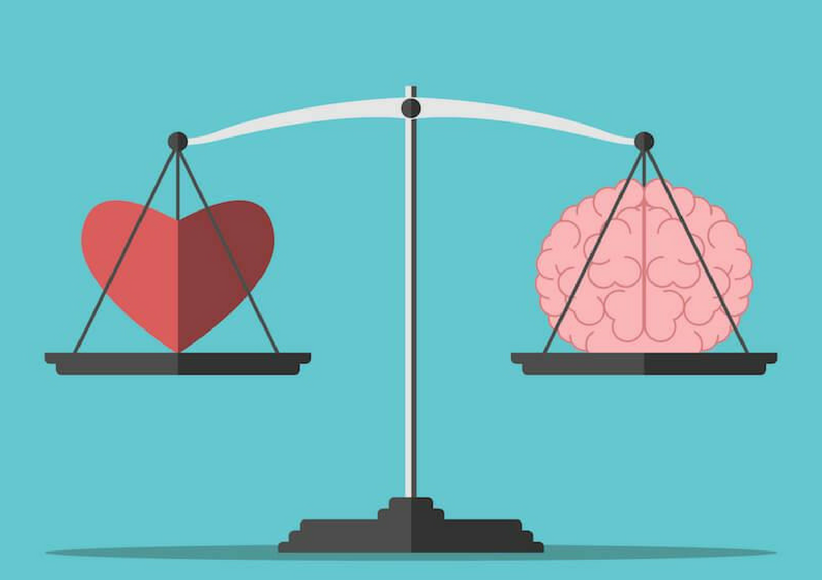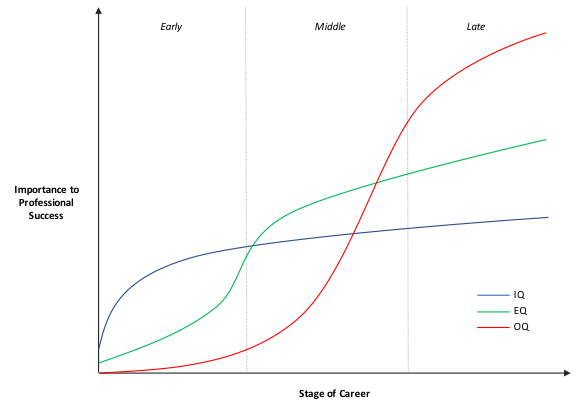
Since coming to Credera I’ve had the opportunity to reach back into my network and re-connect with former clients and colleagues across North America. The most enjoyable part of this process for me has been learning about people’s professional journeys. It’s a topic I’ve grown very interested in as of late, given my own journey and my constant introspection. The management consultant in me looks for patterns in people’s journey and their own evolution as professionals.
What I have come to conclude through these conversations, through my own experiences, and through learning about and from great leaders is that organizational success (here defined by the increase in responsibilities within an organization) requires the development of three specific types of intelligence—intellectual intelligence (IQ), emotional intelligence (EQ), and what I have called organizational intelligence (OQ)—with the importance of each changing throughout the career journey.

Intellectual Intelligence
For most, early career growth comes from the development of a trade craft or set of trade crafts. To be successful in developing a trade craft requires the ability to learn new skills quickly, understand and apply information to the related skills, etc., things loosely associated with IQ, or more simply, intelligence.
In a meritocracy environment, competency and excellence in one’s trade craft are what drive opportunity and promotion, especially in the more “junior” levels of an organizational chart. However, as success is gained so typically is responsibility, requiring the need to demonstrate and grow another intelligence, specifically emotional intelligence. This does not mean trade craft development stops, nor should it, but it does typically transform from building block-type skills development that can be applied to business tasks into more experiential-based learning.
Emotional Intelligence
Emotional intelligence, commonly called EQ, was first introduced in a 1990 research paper by John Mayer and Peter Salovey and was later defined by Mayer as “the ability to accurately perceive your own and others’ emotions, to understand the signals that emotions send about relationships, and to manage your own and others’ emotions”.
In most organizations, or at least those with positive cultures, EQ is essential for successfully building relationships and effectively managing people and their tasks. It is what differentiates great managers and people leaders from average ones. Given this, as EQ increases often so does opportunity—especially at the early and mid-management levels where a strong IQ/EQ mix is most impactful. This can even create opportunities at the highest level of most organizations, including upper management. However, success in upper management almost always depends on a third intelligence—organizational intelligence.
Organizational Intelligence
The definition of organizational intelligence, or OQ for consistency’s sake, is an individual’s ability to identify influence and power within an organization and successfully navigate and engage it to help further their objectives. Typically associated with arenas such as politics, the need for this skill is paramount in upper management within business organizations where agendas often conflict and the stakes are high. It requires organizational awareness, strong corporate diplomacy, as well as high EQ.
While failure to recognize and appreciate the importance of this skill set can lead to failure, it is also important to recognize that OQ doesn’t replace the need for the other two skill sets—especially EQ. Getting “caught up in the OQ game” can lead to short term gain, but those benefits are not sustainable.
How to Improve
So why is this important? Better preparing yourself for success starts with having awareness of the need for all three and should continue with the purposeful development of each:
Intellectual Intelligence: The path for development of IQ or trade craft is most obvious as it is dictated by role (i.e., what type of work you are doing) and industry. But care must be taken to continue to develop subject matter expertise throughout your career or potentially suffer from irrelevance as both role and industry continue to evolve.
Emotional Intelligence: While a less tangible skill, EQ is a skill nonetheless and thus can and should be developed through learning and practice. An article by the Harvard Business Journal, “How to Boost Your (and Others’) Emotional Intelligence,” is a great place to start, with further readings available on many of the topics included.
Organizational Intelligence: As for OQ, utilize tools such as organizational charts, stakeholder maps, and influencer maps to better understand and navigate your organization, and continue to develop your skills of influence and persuasion, both of which can be learned.
By actively developing these three intelligences one can avoid “intelligence deficiencies,” better paving the way for new, larger opportunities and prolonged career success.
Contact Us
Let's talk!
We're ready to help turn your biggest challenges into your biggest advantages.
Searching for a new career?
View job openings